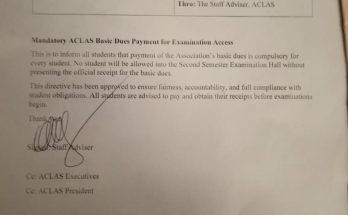By Akinpelu Yusuf
Why do we curse? Is it a curse for some people to curse? Or is curse a course in some people’s faculty? Must we always curse? Should we even ever curse at all? If the word curse is becoming too repetitious, apologies. Don’t curse me yet!
It is not uncommon to hear or see people (and even ourselves) run a
thorough search on their vulgar vocabulary and finding a suiting
cussword each time they are vexed. These cusswords come in various forms: just anything offensive and unclean like curse itself, abuse, foul language, insult and their ilks.
However, different people do this for different reasons. Some to retaliate. Some others to correct. Many more to show anger. Quite a number for fun. A handful to show helplessness. Others to wade off defaulters. Well, these groups of persons, of course, each time they do, have their own stories to tell for choosing to do so.
Take for instance those who curse in retaliation. “People can be nauseating,” they would claim. “People can be frustrating,” they might further say. So in dealing with these people their own way, curse is a choice. And it sure is; but a wrong choice. Maybe the advice of Marcus Aurelius that “the best revenge is to be unlike him who performed the injury,” sounds better.
Also, those who correct with curse have their claim: To make people do the right thing, lay a curse on them, abuse them. And of all the culprits in this category, parents, guardians and in loco parentis generally believe more in this. Some, with the cruelest of whipping and bashing, pomade their wards with lotion of curses. And like that, they – the wards – carry it about all day long, or even all life long. Because I sure know a curse can outlive its bearer. Not to forget those whose mouth has long forgotten how to mouth “sane” words. To show elation, they curse. To show depression, they curse. To joke, they curse. Their lingua franca is the unsung language of cursing.
Even Malcolm X, in his heydays of profanity dexterity, is no match to them. Special thanks must be accorded to Hollywood stars who have ensured our ears and mouths are not bankrupt of cusswords – with us not forgetting their Nollywood counterparts who are following in the same light. They have
successfully top up the data base of members on this group.
That said. From here, we can’t but bring our curiosity of questioning to the fore. For whatever reason – or reasons, be it as it may – a cussword is spilled, who is at the receiving end? The curser? The cursed? Or even the earwitness? (or is it the eyewitness we call them?) Maybe our faith in fate
should settle that. Does curse come to past?
Hungarian, Bela Guttmann, the then coach of Portuguese side, Benfica, in 1962, placed a curse on his team. Following his employee’s refusal to pay him a bonus for winning an European Cup twice in a row, since there was no such clause in his contract, he struck back by cursing thus, “not in 100 years from now will Benfica win an European Cup.” Some added him to have stated in an interview that “no Portuguese team, in 100 years, will manage
to win the cup twice in succession like he did.” Now, Guttmann has since died 36 years ago, yet, disturbingly, his curse still live on – no Portuguese team has defended its European title despite coming close on two occasions; Benfica is yet to win an European title in 55 years despite
reaching the final five times! Most certainly, this curse seems to have
gained its fulfilment. Or is that not so?
Also, far back as 1835, it was believed, Alaafin Aole of the defunct Oyo Empire cursed those who betrayed him. ‘Aole Curse’, as described by Samuel Johnson in his History of Yorùbá, and by other tradition, came when Afonja, the then Oba of Ilorin and Aare Onakankanfo (Generalissimo of Yorùbá Army), rebelled against him, demanding for his head. He – Aole – was said to have placed a curse on his Chiefs who deserted him and the entire Yorùbá race, saying that as they left him never would they have unity among them. This he did by shotting arrows, breaking pot and predicting their downfall to the enemies who will be foreigners way back in 1835.
Aole, too, like Guttmann, has since died, but the manifestation of his curse, though is relative, cannot be totally ruled out. Considering the former and latter, one will begin to see how curses had been laid by deaders for even the unborn generations.
To be continued…




